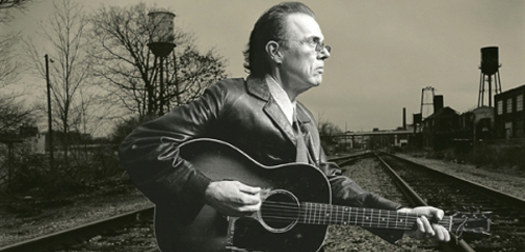Shows
John Hiatt
September 21, 2010 at Paramount Theatre in Rutland‚ VT
by Doug Collette
September 28, 2010
John Hiatt
September 21, 2010 at Paramount Theatre in Rutland‚ VT
by Doug Collette
September 28, 2010
|
|
|
|
 |
||
|
|
|
It takes consummate poise, not to mention a tremendous confidence in your material, to play a solo acoustic show like John Hiatt did in Rutland on the autumnal equinox. No matter the devotion of your audience -- and the Paramount Theatre faithful were equal parts loyal and vocal -- it cannot be easy to command attention for two hours plus alone on the stage.
But Hiatt did it and with virtually no pratfalls. He did flub a lyric at one point, but he's so self-effacing a guy, he was as gracious in admitting his mistake as was the crowd in laughing it off. Moving right along, Hiatt made no greater mention of his faux pas than much of anything else during his single set, thereby remedying a shortfall that once afflicted his solo shows: a predilection to talk too much and destroy the momentum of his performance.
But therein lie that confidence and poise, as well as the recognition, on the part of the artist and the performer, that he's proven himself over the long haul (even if each performance like this is a test in itself). A nod to Bonnie Raitt for covering "Thing Called Love" made it clear John Hiatt's gotten his share of breaks over the years, but he's also made some breaks for himself, persevering through battles with personal demons, taking good advantage of collaborations with other musicians (Ry Cooder and Jim Keltner, The North Mississippi Allstars) and accompanists like The Goners and The Combo that just this spring rocked houses like the one in Lebanon, New Hampshire.
Given that musician-ly pedigree, it's hardly a surprise Hiatt acquits himself so stylishly at the microphone with an acoustic guitar or the piano that afforded him the opportunity to vary the set at mid-point. And he's sanguine about his instrumental skills, never overplaying on breaks of tunes such as "Drive South," but rather relying on the inherent rhythm of the songs.
There have been periods during John Hiatt's thirty-year plus career when his songwriting and arranging has been predictable, he's become wise in his composition of setlists like the Vermont one: he emphasized material such as "Icy Blue Heart" and "Crossing Muddy Waters" that demonstrates how his time working in Nashville was valuable in learning how to craft a song so that its structure enhances its emotional content.
John Hiatt's debt to rhythm and blues distinguishes him even further from his contemporary folk peers too. On tunes like "Feels Like Rain" and "Lipstick Sunset," he trades on familiar conceits in the lyrics but transcends them by dint of the emotion he injects into the performances--and not just through the use of a strong falsetto at just the right time. Hiatt's lived his songs to be sure but, like the truly great songwriter, he turns what he sees in other peoples lives, like "Master of Disaster," into memorable combinations of words and music, the end result of which rings no less true than something straight from his own heart like "Real Fine Love."
As true to his self-restraint as his connection to the audience this early fall/late summer night, Hiatt was able to coax a rowdy sing-along out of the crowd on the second encore of "Memphis in the Meantime." If right after that, most attendees immediately left the beautiful venue rather than accept the man's invitation to a meet and greet at the merch table, it was no reflection on their satisfaction with the concert but rather a testament to the many levels in which John Hiatt connects with his listeners.
new to state of mind
Shows: moe.
Shows: Yonder Mountain String Band
Shows: Grand Point North 2014
Shows: Catskill Chill 2014
Shows: moe.down 15
Shows: Gov't Mule
Shows: Umphrey's McGee
Shows: Newport Folk Festival 2014
Shows: Widespread Panic
Albums: Phish - Fuego
Shows: moe.
Shows: Yonder Mountain String Band
Shows: Grand Point North 2014
Shows: Catskill Chill 2014
Shows: moe.down 15
Shows: Gov't Mule
Shows: Umphrey's McGee
Shows: Newport Folk Festival 2014
Shows: Widespread Panic
Albums: Phish - Fuego
random awesomeness
Blog: Record Store Day at Bull Moose Music (Ani DiFranco)
Blog: Kids These Days: McLovins vs. The Wrong Trousers vs. Gauchos
Blog: "I'm Not a Tour Guide, I'm on Your Side" - Brothers Past live in VA 10/22/10
Blog: Jerry Garcia: It's OK to Wear Shorts...
Features: Conversation with Dana Monteith
Albums: Edmar Castaneda - Entre Cuerdas
Shows: John Brown's Body
Features: Umphrey's McGee: Redefining the Moment - An Interview with Joel Cummins
Shows: Trey Anastasio
Shows: moe.
Blog: Record Store Day at Bull Moose Music (Ani DiFranco)
Blog: Kids These Days: McLovins vs. The Wrong Trousers vs. Gauchos
Blog: "I'm Not a Tour Guide, I'm on Your Side" - Brothers Past live in VA 10/22/10
Blog: Jerry Garcia: It's OK to Wear Shorts...
Features: Conversation with Dana Monteith
Albums: Edmar Castaneda - Entre Cuerdas
Shows: John Brown's Body
Features: Umphrey's McGee: Redefining the Moment - An Interview with Joel Cummins
Shows: Trey Anastasio
Shows: moe.
